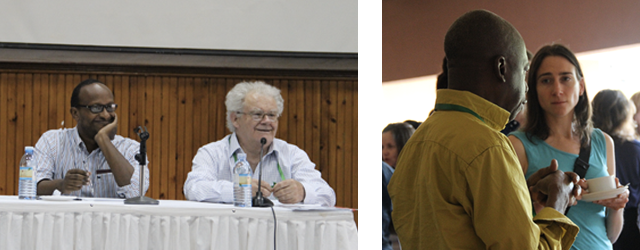The RVI annual field courses feature teams of up to fifteen teachers composed of regional specialists drawn from the region itself and from Europe and America. The most recent additions include Laura Hammond and Berouk Mesfin on the Horn of Africa Course, Judith Verweijen and Jean Omasombo on the Great Lakes Course and Aly Verjee and Nada Mustafa Ali on the Sudan and South Sudan Course.
The field courses take place in June and July 2015 near Naivasha in Kenya. Details of other team members on the courses can be found on the respective course pages and the course prospectus.
Laura Hammond is the Head of the Development Studies Department at the School of Oriental and African Studies (SOAS) in London. She will share her recently completed research on diaspora, remittances and women in Somali politics.
Berouk Mesfin is a Senior Researcher at the Institute of Security Studies (ISS) in Addis Ababa. He was previously a lecturer in Political Science and International Relations at Addis Ababa University.
Judith Verweijen is a Senior Researcher at the Nordic Africa Institute and Conflict Research Group, and a specialist in security sector reform in the DRC. She will be assisting Director of Studies Jason Stearns as Deputy Director on the Great Lakes Course, together with Emily Paddon, Rose Research Fellow at the University of Oxford.
Jean Omasombo, of the Royal Museum of Central Africa in Tervuren, Belgium, returns to the Great Lakes Course for the fourth time to discuss Mobutu’s legacy in the Congo and shed light on the upcoming elections.
Aly Verjee, a Senior Researcher with the Rift Valley Institute, is Political Advisor to the Intergovernmental Authority on Development (IGAD) in Addis Ababa. He will provide insights into the current South Sudanese peace process and earlier peace processes.
Nada Mustafa Ali, an activist scholar and Lecturer in Women’s and Gender Studies at the University of Massachusetts is returning to the Sudan and South Sudan course for the third consecutive year. She will be focussing on civil society and women in Sudan.

The RVI’s annual field courses are intensive, week-long training events that provide the basis for an understanding of current political and development challenges in three sub-regions. They are taught by teams of leading specialists—from the region and beyond—and offer a unique opportunity to spend time with an outstanding group of specialists, away from routine distractions. RVI courses are designed for policy-makers, diplomats, investors, development workers, researchers, activists and journalists—for new arrivals in the region and those already working there who wish to deepen their knowledge. A dawn-to-dusk programme of seminars, lectures, group discussions and special events examines the key social, environmental, political and cultural features of each of the three sub-regions.
Accounts of previous years’ courses can be found here, and testimonials from previous course participants can be read here. In the coming months the RVI will be sending out updates on the courses, including on teaching staff and locations. In order to receive these, please subscribe to the RVI mailing list. You can also follow the Institute on Twitter and Facebook.


